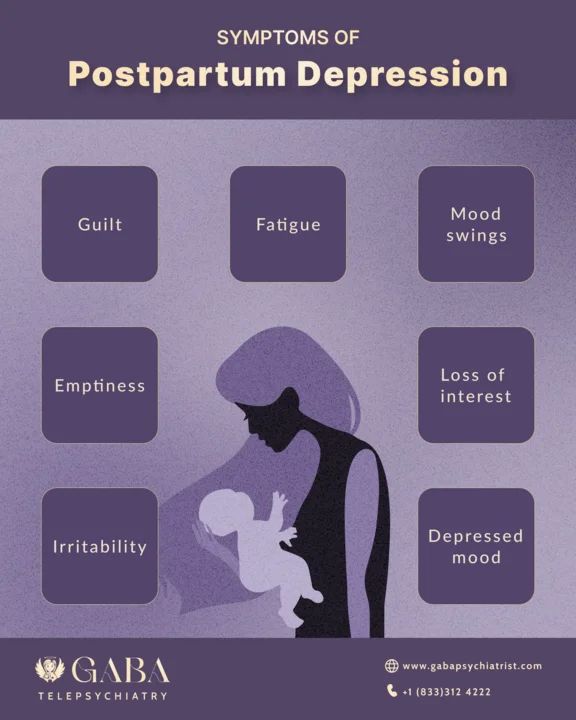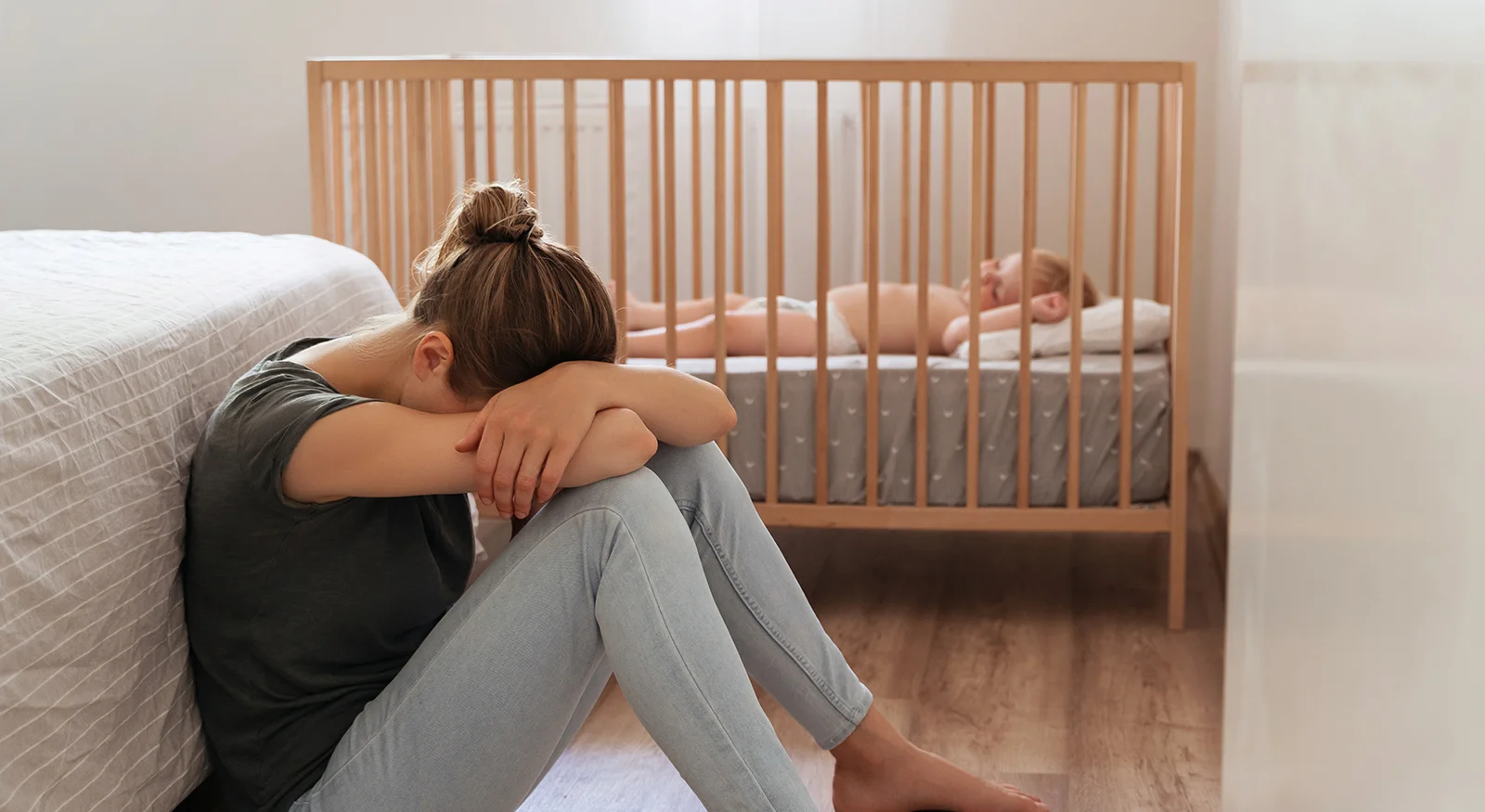Postpartum depression, also called postnatal depression is the onset of a depressed mood and its associated symptoms:
- within the first year of childbirth
- that last for more than two weeks with or without treatment
It is important to seek treatment for postpartum depression. Not doing so can cause long-term adverse effects to both the mother and her baby.
What are the symptoms of Postpartum Depression ?
Postpartum depression can be very isolating for mothers, as it occurs at a time in their lives when society expects them to feel overjoyed about the arrival of the new baby.
Symptoms of postpartum depression can arise in many different ways. It can affect mood, cognition, thoughts, and body sensations. In severe cases, postpartum depression can cause paranoia, delusions and hallucinations. Symptoms of postpartum depression can usually be categorized as follows:
Physical Symptoms of Postpartum Depression
- Fatigue
- Headache
- Back pain
- Muscle ache
- Joint pain
- GI upset
- Abdominal pain
- Low sex drive
Cognitive Symptoms of Postpartum Depression
- Inattention
- Impaired executive functioning
- Impaired problem solving
- Impaired neuroplasticity
- Memory loss
- Slow reaction time
Mood Symptoms of Postpartum Depression
- Bad mood
- Low motivation
- Loss of ambition
- Loss of enjoyment in activities
- Loss of will to live
- Sleep disturbance
- Loss of appetite
Psychotic Symptoms of Postpartum Depression
- Hallucinations
- Delusions
- Loss of touch with reality
- Paranoia
When psychotic symptoms are associated with postpartum depression this is called ‘Postpartum Psychosis’. It is important to get immediate help if such a situation arises.
Psychotic Symptoms of Postpartum Depression
- Negative thoughts about self
- Negative thoughts about others
- Pessimistic thoughts about the future
- Excessive guilt about the past
- Low confidence in abilities
- Low self-worth
- Angry thoughts
- Nihilistic thoughts
- Suicidal thoughts
- Existential angst
How can untreated symptoms of Postpartum Depression affect your career?
Mothers experiencing postpartum depression may experience problems with:
- energy levels
- motivation levels
- attention
- concentration
- irritability
- engagement with colleagues
- reasoning and problem-solving abilities
- frustration tolerance
- productivity
They may find they need help to complete tasks, meet deadlines, or take excessive time off work. They might find themselves having conflicts with colleagues and supervisors that they previously had a good relationship with.
Likewise, colleagues and supervisors might feel confused, frustrated, and unsure how to address the issue of the change in their beloved colleague and friend. After all, nobody wants to be a ‘workplace bully or impolite with a new mother.
Due to PPD, working mothers are also likely to be passed over for promotion or even terminated from their current position at the workplace.
How is Postpartum Depression different from Baby Blues?
‘Baby Blues’ is a common condition that affects about 80 percent of new mothers. It is a period when women experience low mood, anxiety, and irritability that begins within the first week of childbirth. Baby blues are caused by hormonal shifts, especially when levels of estrogen, progesterone, and growth hormone drop after giving birth. It can also be exacerbated by factors such as traumatic delivery, sleep deprivation, and fatigue.
Baby blues is usually a self-limiting condition and should resolve within two weeks. It does not typically need treatment. Support from family and colleagues can be enough to alleviate the symptoms. If symptoms do not seem to resolve within a fortnight, they may indicate postpartum depression.
Why is it impotant to get treatment for Postpartum Depression?
Untreated postpartum depression symptoms can cause disruption in your personal and professional life. Consequences to baby or infant include:
- disruption to attachment and bonding between mother and baby
- baby can experience an increase in anxiety, failure to thrive, feeding difficulty, and developmental delay
- baby may experience long-term difficulty with relationships
- baby may experience long-term cognitive impairment, and failure to achieve expected milestones
- baby may experience longer-term difficulty with social or occupational functioning
Effects of Postpartum Depression on Relationships or Marriage
The absence of your partner during the postpartum depression phase is undesirable. Even if the partner is present but does not understand postpartum depression, it may cause marital or relationship difficulty at a time when you need to support each other the most.
The depressed parent is likely to feel impatient and angry with her partner. Likewise, the partner may also exhibit feelings of resentfulness due to a lack of physical and emotional intimacy. During this period, it is common for couples to stop participating in mutual leisure activities, such as traveling, seeing friends, going to the gym, and evenings out.
Sometimes, this disconnection increases so much that partners even forget to identify their mutual feelings of love and attachment. Untreated postpartum depression can increase the chance of marital discord, separation, and even result in divorce. It may also wreak havoc on your self-esteem and body image. As a result, postpartum depression may also lead to feelings of disconnection during physical intimacy and loss of interest in having sex with your partner.
The most effective resort to solving such difficulties at an early stage is receiving treatment for postpartum depression. Since family is one of the most precious possessions in our lives, it is always wise to save these relationships at the right time, to lead a healthy and happy family life.
Effects of Postpartum Depression on Health
Besides adversely affecting your mental health, PPD can have a serious impact on your physical health. A new mother going through this condition may experience:
- huge loss in energy and motivation levels
- feelings of restlessness
- change in food habits (leaning towards comfort eating, binging on junk food and experiencing heightened sugar cravings)
- disrupted sleep cycles, sleeping too little or too much
- chronic stomach problems, headaches or body pains
- poor self-care
These health effects can be disturbing and overwhelming. To lead a healthy life after childbirth, you should consider getting postpartum checks and seeking treatment if diagnosed.
Effects of Postpartum Depression on Elder Children
Postpartum depression can rob a woman of her self-belief, happiness, and the ability to parent her children. While we may think that this condition affects just the mother and the new baby, it also increases problems for the entire family, including the elder children.
A depressed mother is already having a difficult time adjusting to the birth of her new child. In such a scenario, the elder children will notice a change in their relationship with her.
The elder children may experience alienation, changed behavior, and lack of love from their mother. Usually, mothers going through postpartum depression find it difficult to maintain their relationships with their elder children, and this leads to a lack of bonding between them.
This may make the elder children believe that their mother does not care for them anymore and is giving more priority to the new baby. However, the truth is that she is just depressed and burned out.
Therefore, an early diagnosis and treatment of postpartum depression are very essential for the betterment of the whole family. With the right diagnosis, the family members, including the elder children can play their respective roles in making it easy for you.
What does it feel like to have Postpartum Depression?
The postpartum depression phase is thought to be one of the most exhausting and overwhelming periods in a woman’s life. During our interaction with 47-year-old Angela, mother of two young children, we explored how postpartum depression can disrupt a mother’s life, especially when she is gripped by a lack of awareness.
She ‘thinks’ that she experienced Postpartum Depression after the birth of her first child. She realized this much later when she learned about this condition. She recalls having almost all the symptoms, going through an extremely low phase, inability to bond with her baby, feelings of guilt and not being a good mother, low self-esteem and motivation levels, disturbed sleep cycles, and constant mood swings.
“For my entire life, I thought that being a mother was the only thing I’d be good at. But when the low phase hit, I lost belief in myself,” she said.
Angela shared how postpartum depression affected her relationship with her husband, as she experienced a lack of support from him, as he was also unaware of what she was experiencing, and why. She was mostly lethargic, had no motivation to do the household chores, and spent many sleepless nights.
It was even heartbreaking to know that she was afraid to talk to her friends about her condition, as a fear of being judged had constantly gripped her. There was even a moment when she regretted having a baby.
It took Angela almost two to three years to come out of postpartum depression, because of which she even had to pursue a career break. Having worked almost all her life, she remembers how difficult it was for her to miss out on her professional life. She used to mask these feelings by trying to be extra productive at home.
Just to comfort herself a little, Angela remembers turning to food. She ate a lot and then dealt with feeling miserable afterward. She gained some extra weight, and her relationship with food was negatively impacted.
Angela does not recall any personal/family history of mental health conditions. She recommends integrating natural ways such as yoga, meditation, and dietary changes to deal with postpartum depression.
She also suggests that asking for help is normal. Angela recommends choosing Online Psychiatry as a treatment and emphasizes its importance. According to her, online mental health evaluations and sessions are more comfortable, as one does not feel the fear of being judged during a conversation. Board-certified and experienced online psychiatrists, like those at Gaba Telepsychiatry, ensure that the virtual interactions are as effective as physical ones.
It was comforting to know that Angela’s second pregnancy was much easier. She remembers instantly bonding with her second child. She suggests all mothers be aware of how postpartum depression can affect all aspects of their lives. If suffering, there is no shame in seeking professional help.
Help for Postpartum Depression
It is essential to seek help for Postpartum Depression. Untreated depression can cause long-term difficulties with academic performance, careers, relationships, and physical health.
Who is at a higher risk of developing Postpartum Depression?
In certain situations, a woman could be at a higher risk of developing Postpartum Depression, This can be due to the following circumstances:
- Having a personal history of depression/bipolar disorder
- Having a family history of depression/bipolar disorder
- Experiencing a lack of support from friends and family
- Problems with previous pregnancy
- Becoming a mother at a young age
- Addiction to drugs, alcoholism, substance abuse, etc.
- Having an unwanted or unplanned pregnancy
What is the treatment for Postpartum Depression?
Ultimately, treatment of postpartum depression must include addressing the underlying cause. There are many (causes of postpartum depression)
- Screen for medical causes of postpartum depression, such as anemia, thyroid disease, Sheehan’s syndrome, nutritional deficiencies, and polycystic ovarian syndrome
- Establish sleep hygiene, and collaborate with a partner to establish times for catch-up sleep
- Education for both mother and partner
- Workplace documentation and accommodations. Consider what support is needed so the mother can continue working if desired or if she needs to take time off
- Utilize resources, including childcare, and reach out to family members, including grandparents, if possible
- Nutritional Supplementation if required
- Counseling regarding breastfeeding and other issues
- Psychotherapy
- Individual Psychotherapy
- Medications if symptoms are persistent or interfering with social and occupational functioning
- Alternative treatments include yoga, meditation, acupuncture, and exercise
Should I take medication for Postpartum Depression Symptoms?
Consuming medication for postpartum depression is a personal choice. Medication is usually indicated if:
- Symptoms of Post-partum depression are severe or persistent.
- Symptoms are interfering with your ability to bond with your child.
- Symptoms are interfering with your ability to take care of your child or children.
- Symptoms are negatively affecting personal or workplace relationships.
- Symptoms are interfering with your ability to take care of your family.
- Symptoms are interfering with your ability to engage with your partner.
- Symptoms are interfering with your ability to perform at work.
- Natural or alternative treatments have not been effective.
How can an Online Psychiatrist treat your Postpartum Depression Symptoms?
Postpartum depression or maternal depression is linked to increased morbidity for the mother, and should not be left untreated. Timely intervention from an experienced psychiatrist is important to facilitate recovery.
According to Dr. Gundu Reddy, Medical Director at Gaba Telepsychiatry, “It is an important decision for anyone to take medication for postpartum depression, and any psychiatric medication must be prescribed with utmost care.” Dr. Gundu Reddy believes that when prescribing psychiatric medication, the goal is to achieve maximum efficacy with minimum side effects and gentle titration.
Treating postpartum depression saves careers, marriages, and facilitates attachment and bonding not just between mother and baby, but with older children also. Untreated postpartum depression is a common cause of divorce and job loss and is often just overlooked, or mistaken for adjustment difficulties.
Telepsychiatry has made specialist psychiatric care for pregnant and postpartum women more accessible, especially to people living in remote locations.
Many women suffering from postpartum depression fear stigma or are afraid to approach a psychiatrist. An effective psychiatrist, whether regular or online, will be a good listener so that they can constructively address your symptoms and concerns. Empathy, understanding, communication, and collaboration between a psychiatrist and patient are critical for good treatment outcomes.
If you are looking for support, you can call us at 1833-312-4222 or schedule an appointment online via our website.
Our board-certified Online Psychiatrists are available in New York, South Carolina, Tennessee, Illinois, Florida, New Jersey, and California.


